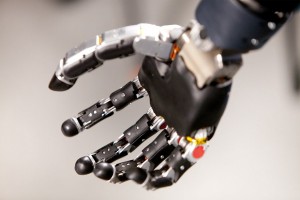
Traditionally, prosthetics were not seen as equal to actual limbs in the eyes of personal injury laws, as these devices resembled more mechanical-like contraptions than human flesh. However, as a recent law conference explored—this could soon change, as prosthetics start to resemble human limbs more and more each year. Specifically, this conference—titled “Human Enhancement and the Law: Regulating for the Future”–explored the work of the Neuro Law Project: researchers who are exploring whether and how the concept of personal injury might need to be expanded to order to include damage to prosthetics when people have become reliant on them.
In particular, some prostheses are now activated by signals sent by actual muscles and/or deeply integrated into the body itself (for example, a prosthetic permanently fused to the bone marrow, known as the “osseointegration”). New technologies are also being invented every day to become more and more integrated with the body and develop in accordance with neurotechnology such that—someday–these limbs might even be able to be controlled by the brain.
Will The Law Evolve To Address Prosthetics and Changing Personhood-Property Boundaries?
If the law does begin to recognize that prosthetics and implants are becoming more and more integral to people’s actual body limbs and parts, it would essentially have to shift from treating damage to these devices as damage to property and consider any harm, threats, etc. to a prosthetic device as they do assault, battery, etc. against a person.
However, there will likely be some push-back from some voices in the law, arguing that these devices should always be considered to be property because they technically lack human DNA.
But what about the psychological connections that sometimes form with prosthetics? Many have reported them as being a part of their own body; specifically,” part of [their own] skin.” If an artificial limb is part of who you are as a whole, shouldn’t it be treated that way by society? Just as many pet owners insist that their dog or cat is a beloved member of their family and should not be treated as mere property–like a chair–in the eyes of the law, many of those who wear prostheses do not understand how part of their “living self” can be considered similar to, for example, a cell phone.
Take the example of one case brought by a veteran quadriplegic whose mobility assistance device was damaged by an airline such that—without it—he ended up being bedridden for close to a year and—due to the degree of his reliance on the mechanism—he was unable go about his routine and even had to pay for assistance on a regular basis. The airline initially only offered the veteran the replacement cost of the device ($1,500) instead of all of the many other damages and compensation actually involved. Eventually, they compensated him $20,000 instead of a mere $1,500.
Dedicated Personal Injury Attorneys
The personal injury attorneys at Harrell & Nowak understand how the latest technologies could affect the field of personal injury law, and how these evolving studies can affect your rights. We have been helping people in New Orleans, Kenner, Metairie, and throughout Louisiana obtain financial compensation for their injuries successfully for many years. Our accident lawyers will work to ensure that your rights are protected and that you receive a fair recovery for your injury. Contact us today for a free consultation.
